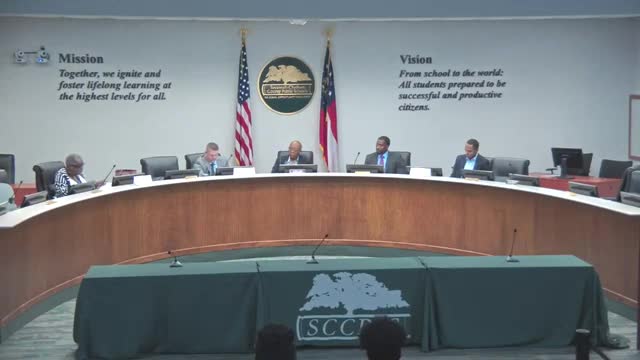Audit reveals alarming SLP caseloads exceeding state limits
October 24, 2024 | Savannah-Chatham County, School Districts, Georgia
This article was created by AI summarizing key points discussed. AI makes mistakes, so for full details and context, please refer to the video of the full meeting. Please report any errors so we can fix them. Report an error »

During a recent government meeting, officials discussed critical findings from an audit focused on speech-language pathologists (SLPs) in Georgia schools. The audit, conducted between April and June 2024, utilized a judgmental sampling method involving ten schools, which raised questions about the selection process and its implications for the findings.
One of the primary concerns highlighted was the excessive caseloads for SLPs, with some managing up to 99 students, significantly exceeding the state-mandated limit of 55. This discrepancy poses challenges for SLPs in fulfilling their responsibilities effectively, as the American Speech-Language-Hearing Association (ASHA) emphasizes a focus on workload rather than strict caseload numbers. The audit revealed a median caseload of 68, indicating a pressing need for intervention.
The meeting also addressed the role of speech-language pathology assistants (SLPAs), who can support SLPs but are not permitted to carry their own caseloads. The disconnect between state regulations and ASHA recommendations was noted, particularly regarding the qualifications required for SLPAs. While ASHA mandates a bachelor's degree for credentialing, Georgia classifies SLPAs as paraprofessionals, which complicates hiring practices.
Officials acknowledged the district's efforts to address high caseloads, including strategies to increase the use of SLPAs. However, they expressed concerns about the competitiveness of salaries for SLPs and SLPAs, which may hinder recruitment efforts. Currently, there are significant vacancies for SLPAs, with only one of five positions filled.
The meeting concluded with a call for a review of funding levels for SLPs and SLPAs, emphasizing the need for adequate resources to ensure that students receive the necessary services. The audit represents a pioneering effort to assess the state of speech-language pathology services in Georgia, highlighting the urgent need for systemic changes to better support both practitioners and students.
One of the primary concerns highlighted was the excessive caseloads for SLPs, with some managing up to 99 students, significantly exceeding the state-mandated limit of 55. This discrepancy poses challenges for SLPs in fulfilling their responsibilities effectively, as the American Speech-Language-Hearing Association (ASHA) emphasizes a focus on workload rather than strict caseload numbers. The audit revealed a median caseload of 68, indicating a pressing need for intervention.
The meeting also addressed the role of speech-language pathology assistants (SLPAs), who can support SLPs but are not permitted to carry their own caseloads. The disconnect between state regulations and ASHA recommendations was noted, particularly regarding the qualifications required for SLPAs. While ASHA mandates a bachelor's degree for credentialing, Georgia classifies SLPAs as paraprofessionals, which complicates hiring practices.
Officials acknowledged the district's efforts to address high caseloads, including strategies to increase the use of SLPAs. However, they expressed concerns about the competitiveness of salaries for SLPs and SLPAs, which may hinder recruitment efforts. Currently, there are significant vacancies for SLPAs, with only one of five positions filled.
The meeting concluded with a call for a review of funding levels for SLPs and SLPAs, emphasizing the need for adequate resources to ensure that students receive the necessary services. The audit represents a pioneering effort to assess the state of speech-language pathology services in Georgia, highlighting the urgent need for systemic changes to better support both practitioners and students.
View full meeting
This article is based on a recent meeting—watch the full video and explore the complete transcript for deeper insights into the discussion.
View full meeting
